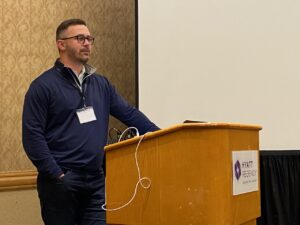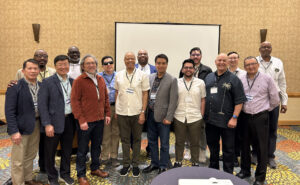
GLORIETA, N.M. (BP)–Mention the “C” word in some churches and you’re likely to get an earful. But it doesn’t have to be that way, a leadership and worship consultant from the Arkansas Baptist State Convention said.
Glen Ennes believes ministers of music can teach their congregations to love choruses. It’s all in their approach.
“One mistake we often make is that we expect too much too soon from our people,” Ennes said. “You can’t cram this down your congregation’s throat. It takes time.”
Ennes led several seminars related to music ministry in the smaller church during the 1999 Church Music Leadership Conference July 10-15 at LifeWay Conference Center, Glorieta, N.M. More than 1,500 music ministers, church musicians and lay leaders attended the conference, which was sponsored by the music ministries department of LifeWay Christian Resources of the Southern Baptist Convention.
Ennes gave several suggestions for teaching a church to love choruses, including:
1) Be wise in your selection. Make sure the text is theologically true, that it flows and fits the occasion. Make sure the melody is in a medium range so everyone can sing it, and keep the length short enough so it can be easily memorized.
2) In introducing the chorus, sing it by yourself on the first Sunday. The next Sunday let the choir sing the chorus after teaching it to them in choir rehearsal. On the third Sunday, have the text to the chorus in the bulletin. Sing it as a solo, add the choir on the second time through and then invite the congregation to sing on the third time.
3) Don’t ask the congregation to sing anything by memory that you have not memorized yourself. Often it’s good to have the words available anyway, as visitors likely will be unfamiliar with the chorus.
4) Don’t feed the congregation a steady diet of new choruses. Keep a list of choruses and their source that are familiar to your congregation.
While it is an unfair generalization that all young people don’t like hymns and older people don’t like choruses, Ennes said senior adults are often harder to convince choruses have merit. Since many seniors were raised on the Broadman Hymnal, he suggested the following approach:
Begin singing solos from the Broadman Hymnal, such as “Only Believe,” “Into My Heart” and “Sweeter Than the Day Before.”
“You will notice that they will begin singing along with you,” Ennes said. “Invite them to sing on the second time through.
“The relationship we are trying to develop through worship is with God, not with a particular style of music,” Ennes said. “What we are trying to do is bring people into an encounter with the Almighty.”















